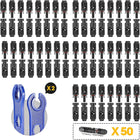12V vs. 24V Solar Panels: Which One is Right for You?

So, you’re thinking about going solar and powering up with clean, renewable energy. That’s awesome! But now you’re staring at a bunch of technical specs and scratching your head over one key question: Should you go with 12V or 24V solar panels? Let's break this down in a friendly, straightforward way so you can make the best decision for your solar setup.
Understanding the Basics
First things first, let's get on the same page about what these numbers mean. When we talk about 12V or 24V solar panels, we're referring to the voltage of the system. Voltage is basically the pressure that pushes electric current through a circuit. Think of it like water pressure in a hose; higher voltage means more "push" behind the electricity.
What Are 12V Solar Panels?

Source: YouTube
Most people start with 12V systems because they are standard for small setups. They’re perfect for:
- RVs and boats
- Small off-grid cabins
- Portable solar kits for camping
In these scenarios, a 12V system is usually ample for running lights, charging batteries, and powering small devices.
What Are 24V Solar Panels?

Source: YouTube
On the other hand, 24V systems are typically used for larger setups where more power is needed. They’re great for:
- Larger off-grid homes
- Industrial applications
- Systems where efficiency is a major concern
The main advantage here is efficiency. Higher voltage means less current is needed to deliver the same amount of power, which reduces energy loss.
The Nitty-Gritty Differences
Okay, now that you know what each type of solar panel is typically used for, let’s dive into the key differences between 12V and 24V solar panels.
1. Efficiency

Source: BougeRV 24V TopCOn solar panel
When it comes to efficiency, 24V systems generally have the upper hand. Why? Because they reduce the amount of current running through the wires, which minimizes energy loss. This is particularly important if you have a long distance between your solar panels and your battery bank. A 24V system will waste less energy as heat compared to a 12V system.
2. Cost
Cost is always a big factor when making a decision. Generally speaking, 12V systems tend to be cheaper upfront because they are smaller and require less specialized equipment.
However, 24V systems can be more cost-effective in the long run due to their improved efficiency and lower energy loss.
3. Compatibility
This is a crucial point. Make sure whatever voltage you choose matches your existing equipment. If you already have a 12V battery bank or appliances designed for 12V, it makes sense to stick with 12V solar panels.
On the flip side, if you’re starting from scratch or planning a larger system, 24V solar panels might be the better choice.
4. Wiring and Installation
Higher voltage systems (like 24V) require thinner wires for the same amount of power, which can make installation simpler and cheaper. You’ll need fewer materials, and the overall setup can be more streamlined.
However, if you're new to solar installations, you might find a 12V system easier to understand and set up, especially for smaller applications.
5. Expandability
If you plan on expanding your system in the future, consider that 24V systems can scale up more easily than 12V systems. It’s simpler to add more solar panels and batteries without needing to overhaul your entire setup.
Real-World Applications

Now, let’s talk about some real-world scenarios to help you decide.
Scenario 1: The Weekend Warrior
Imagine you’re an outdoor enthusiast who loves weekend trips in your RV. You want to run some lights, charge your phone, and maybe power a small fridge. For this purpose, 12V solar panels are probably all you need. It's simple, cost-effective, and sufficient for light usage.
Scenario 2: The Off-Grid Homesteader
Now picture yourself living off the grid in a cabin. You’re running lights, a refrigerator, and maybe even some power tools. Here, 24V solar panels would likely serve you better. You'll benefit from higher efficiency and have more room to expand your system as your needs grow.
Scenario 3: The Green Industrialist
Suppose you’re running a small business that requires a lot of power—like a farm with multiple pieces of equipment. In this case, 24V solar panels are almost certainly the way to go. The reduced energy loss and potential for scalability make it a smart investment.
Making the Decision
So, how do you choose? Here are some final tips to guide your decision:
- Assess Your Power Needs: Calculate how much power you need now and think about any future requirements.
- Consider Your Budget: Look at both upfront costs and long-term savings.
- Check Compatibility: Choose a voltage that matches your existing or planned equipment.
- Think About Ease of Installation: Simpler might be better if you’re doing it yourself.
- Plan for Expansion: Pick a system that can grow with your needs.
Final Thoughts
Choosing between 12V and 24V solar panels doesn’t have to be complicated. It boils down to your specific needs, your budget, and how you plan to use the system. If you’re just starting out or only need a small amount of power for occasional use, 12V solar panels will likely suit you just fine. However, if you’re looking at a more permanent, larger-scale setup, investing in 24V solar panels could offer better efficiency and scalability.
Whichever route you choose, you’re making a fantastic move by going solar. Not only will you save money in the long run, but you’re also helping to reduce reliance on fossil fuels and promote sustainable living. And that’s something we can all feel good about!














































































































































































































